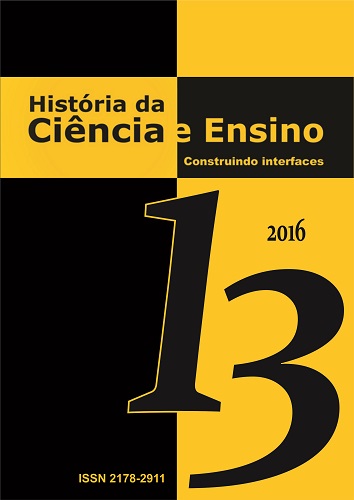As contribuições do americano Henry Allan Gleason (1882-1975) para a Ecologia no início do século XX
Resumen
Resumo
O objetivo deste trabalho é discutir as ideias apresentadas por Henry Allan Gleason (1882-1975) em seu artigo de 1917, intitulado “The structure and development of the plant association” (A estrutura e desenvolvimento da associação de plantas), publicado no periódico Bulletin of the Torrey Botanical Club. No final do século XIX e nas primeiras décadas do século XX, período no qual a Ecologia foi se constituindo como ciência, muitas ideias sobre a dinâmica da vegetação foram discutidas. Neste sentido, o contexto da época foi considerado a fim de averiguar as concepções que eram aceitas sobre o assunto. Gleason discordou sobre alguns pontos existentes no livro Plant Sucession, do ecólogo americano Frederic Edward Clements (1874-1945), publicado em 1916, tais como: sua visão de que a unidade de vegetação seria um organismo, expressa primeiramente em 1905 no livro Research methods in Ecology; a inclusão não somente do clímax, mas também a proposta de toda a série sucessional culminar no clímax; a introdução de vários novos termos em uma terminologia já sobrecarregada; o desenvolvimento de um esquema analítico próprio em que várias exceções eram excluídas pela definição. Gleason divergia principalmente sobre os conceitos de clímax e sucessão das associações de plantas propostos por Clements. Ele sugeriu o conceito individualístico da ecologia em oposição ao conceito de organismo complexo, difundido por Clements e amplamente aceito na época.
Palavras-chave: História da Ecologia; Conceito Individualístico; Henry Allan Gleason (1882-1975).
Abstract
The objective of this paper is to discuss the ideas presented by Henry Allan Gleason (1882-1975) in his article in 1917, entitled "The structure and development of the plant association", published in journal Bulletin of the Torrey Botanical Club. In the late nineteenth century and the first decades of the twentieth century, during which the Ecology was constituted as a science, many ideas on vegetation dynamics were discussed. Thereby, the context of the time was considered in order to ascertain the views that were accepted on the subject. Gleason disagreed on some existing points in the book Plant Succession, the American ecologist Frederic Edward Clements (1874-1945), published in 1916, such as his view that the vegetation unit would be an organism, first expressed in 1905 in the book Research methods in Ecology; including not only the climax but also the proposal of all successional series culminate in the climax; the introduction of various new terms in an already overloaded terminology; the development of a proper analytical scheme, in which several exceptions were excluded by definition. Gleason differed mainly about the concepts of the climax and succession of plant associations proposed by Clements. He suggested the individualistic concept of ecology as opposed to the concept of complex organism spread by Clements and widely accepted at the time.
Keywords: History of Ecology; Individualistic Concept; Henry Allan Gleason (1882-1975).


